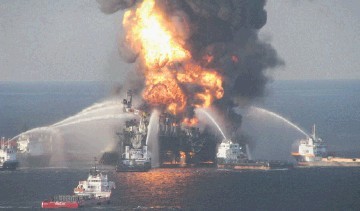
ATP Oil and Gas has filed for bankruptcy after failing to recover from a ban on deep-sea drilling in the Gulf of Mexico following the Deepwater Horizon explosion.
The US firm, which oversees the North Sea Cheviot field and has signed multimillion-pound deals to develop the project, said the six-month moratorium in the basin after the Macondo well blew out in April 2010 had held up its production plans.
Houston-based ATP reported total debts of £2.2billion, but said it had received nearly £400million from its lenders so it could continue operations while restructuring its finances.
ATP said the explosion on the BP-operated Deepwater Horizon rig, which killed 11 people, and the subsequent ban on drilling had “dramatically impacted” on its cash flow and development proposals.
In a statement, the company said: “These events prevented ATP from bringing to production in 2010 and in early 2011 six development wells that would have added significant production to ATP.”
The company added three of these wells still had not been drilled.
“Had ATP been allowed to drill and complete these wells, ATP believes it would have provided a material production change in 2010 continuing to today,” the firm said.
ATP’s biggest unsecured creditor is understood to be Bluewater Industries, the engineering, procurement and construction management contractor on the Cheviot field, which ATP owes £34.2million.
ATP agreed a string of contracts earlier this year for the development of Cheviot. Petrofac was awarded a multimillion-pound pre-operations deal for a floating production facility, while Subsea 7 agreed a £100million-plus contract for work on the development about 75 miles east of Shetland. GE Oil & Gas also won a £49million contract to supply ATP with subsea production equipment and ancillary systems for the project, which is a redevelopment of a previous field.